Diarrhoea in cats and dogs causes and treatments
Diarrhoea in cats and dogs can occur at any age. Often it’s nothing to worry about and you can treat it at home using a suitable stool firming product. However, sometimes diarrhoea in cats and dogs is a sign of a more serious problem, which requires veterinary attention.
How long does diarrhoea last in cats and dogs?
If your cat or dog has blood or mucus in their diarrhoea or it has lasted for 3 days or more, contact your vet immediately. We also recommend seeking further advice if any of the following applies to your pet:
- Your pet has been experiencing diarrhoea on and off for several weeks
- The diarrhoea has been constant for over 24 hours
- Your pet is also vomiting
- Your pet shows signs of pain or discomfort in the tummy area
You know your pet best; if you’re concerned seek further advice from your vet.
What can I give my pet to soothe their stomach and help with diarrhoea?
For mild cases of loose stools and diarrhoea, you can treat your pet at home with a suitable product, particularly if you know the cause. Beaphar IntestoPro Paste contains natural active ingredients to help firm stools. It also contains added prebiotics, MOS and FOS, to promote normal bowel function, helping soothe your pet’s sensitive tummy. Available for cats and dogs, the tasty paste comes in a graduated syringe making it easy to give your pet. It's ideal for helping cats and dogs suffering from digestive disturbances.
What is the most common cause of diarrhoea in cats and dogs?
Some common causes of diarrhoea in cats and dogs are treatable at home or can even be avoided or lessened with the right preparation. The causes can be divided into five key areas. You can click to find out more about each cause of diarrhoea:
- Diet
- Inappropriate eating habits (e.g. scavenging)
- Stress
- Travel
- Not otherwise specified (e.g. parasitic infections or following certain medications)
Diet
Possibly the most common causes of diarrhoea in cats and dogs are diet-related. This could include:
- Diet changes
- Eating spoilt food
Changing from one diet to another is something all pets experience during their life. For example, during weaning or when changing from kitten or puppy food to adult food. This can cause our pets to experience tummy trouble. The digestive systems has to get used to processing the different nutrients from the new food, which can cause loose stools and diarrhoea.
Another thing to consider is that not all pet food manufacturers use a `fixed formula' when making pet food. A ‘fixed formula’ is when the food contains exactly the same ingredients in every batch. Some use an `open formula' meaning the primary composition may vary between batches. For pets with a sensitive stomach, this can cause gastrointestinal disturbances even when the brand of food being fed hasn’t changed.
Fortunately, you can avoid or lessen the chances of loose stools by conducting the diet change slowly. This allows your pet’s stomach to get used to the nutrients from the new food, and can help avoid tummy problems. We recommend mixing a small portion of the new food with the old food. Then, slowly increase the amount of new food and reduce the amount of old food. Complete this process over a few weeks until your pet has transitioned foods completely.
If your pet lives in a multi-pet household, try to prevent the cat from eating the dog's food or vice versa. This can also cause stomach upsets.
Just like with us, if your pet eats spoilt or rotten food they will often experience diarrhoea. Other symptoms are vomiting, lethargy and dehydration. Try to avoid your pet raiding the dustbin for scraps; use one with a lid or position it somewhere your pet cannot get to. Although we don't recommend giving your pet scraps, always check any meat you give your cat or dog is fresh or thoroughly cooked. If you have any concerns about the food, throw it away; it’s better to be safe than sorry.
Eating spoilt food also risks picking up bacterial infections, which would need further treatment from a vet.
Inappropriate eating habits
Most pets will eat something they shouldn’t from time to time. Alongside loose stools or diarrhoea, certain eating habits can cause more serious health problems. Inappropriate eating habits in cats and dogs may include:
- Eating inappropriate food, e.g. human food
- Eating non-food stuff (pica)
- Scavenging
All owners will have experienced ‘puppy dog eyes’ from our pets when we’re at the dinner table, and it's tempting to feed them. However, certain human foods can be harmful to our cats and dogs, or even toxic, causing upset tummies or more serious problems. Alongside this, feeding human tidbits can contribute to dental problems in cats and dogs.
For some pets, it’s not eating human food that is the problem but eating non-food stuffs, which is known as pica. Such items may include stones, plastic, dirt and metal. Pica is a psychological, compulsive behavioural issue, but it can also indicate another medical issue or even nutritional deficiencies. If you notice your pet eating non-food items, seek veterinary advice. The ingested items often cause blockages, choking and other problems; your pet may need surgery to remove the items. Your vet can also check for any underlying health reasons for your pet’s eating habits and offer further advice.
Stress
Like us, our pet’s stress can impact other areas of their health, including their bowel movements. Stress-related diarrhoea can be caused by:
- Moving to a new home
- A new pet moving in or a new baby
- Changes in the environment (e.g. loud noises, building work)
- Irritable Bowel Disease (IBD)
Changes to the home environment can very stressful for pets, in particular long term causes of stress, such as moving home or introducing a new pet.
A new home will have lots of unfamiliar sounds and smells which can be overwhelming for our pets. Young kittens and puppies leaving their mother and littermates for the first time can find this especially scary. All this anxiety could have some impact on their tummy, causing loose stools.
Introducing a new pet to your home can cause an enormous amount of stress to your existing pet. Cats in particular are territorial. A new cat can cause them to worry about resources, such as food and litter trays. A good rule for multi-cat homes is to have the same number of bowls, litter trays etc. as you have cats, plus one extra.
There are several things you can do to reassure pets when going to a new home, introducing a new pet and other stressful situations, including using a calming product.
Travel
Cats and dogs can suffer from travel sickness just like we do, with one symptom being diarrhoea. Travel sickness can be common in young kittens and puppies, and often (like children) they will eventually grow out of it. However, even in older pets, the stress and anxiety caused by travelling can cause diarrhoea.
You can often solve mild travel sickness and diarrhoea at home through patience and training. For more severe cases you may need to talk to your vet so they can prescribe anti-sickness medication.
Other causes of diarrhoea
- Worms and other internal parasites
- Following certain medications (e.g. worming treatments or antibiotics)
- Viral or bacterial infections
Although uncommon, worming treatments sometimes cause diarrhoea. It will usually resolve itself within a couple of days. However, if this happens, contact the product manufacturer or the vet who prescribed it for further advice.
Antibiotics are valuable for many reasons, but they are commonly known for disrupting the natural gut flora, causing diarrhoea.
Diarrhoea is not a pleasant experience for anyone, including cats and dogs. While unpleasant, it is actually the body’s natural response to dealing with foreign material, whether it be viral, parasitic or a physical foreign object that has been ingested. This said, if your pet's diarrhoea doesn't resolve after three days or is constant and excessive, we recommend seeking veterinary advice.




